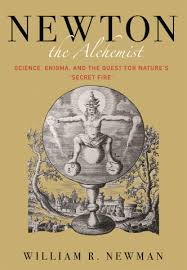Dmitri Levitin at Literary Review:
 The discovery of Newton’s alchemical manuscripts – containing no fewer than a million words, some of the pages mutilated by the acids used during his quest for the philosopher’s stone – led to a flurry of scholarly activity. This culminated in the 1980s in the work of Richard Westfall, still Newton’s greatest biographer, and Betty Jo Teeter Dobbs. In a spectacular rejection of Butterfield’s dismissiveness, they argued that alchemy underpinned Newton’s whole world-view. Newton’s belief in transmutation, Dobbs claimed, was akin to a religious quest, with the ‘philosophic mercury’, believed to be ableto break down metals into their constituent parts, acting as a spirit mediating between the physical and divine realms. Westfall suggested that it was assumptions born in Newton’s alchemical researches about invisible forces acting at a distance that allowed him to develop his greatest theory: that of universal gravitation, which he announced to the world in his Principia of 1687.
The discovery of Newton’s alchemical manuscripts – containing no fewer than a million words, some of the pages mutilated by the acids used during his quest for the philosopher’s stone – led to a flurry of scholarly activity. This culminated in the 1980s in the work of Richard Westfall, still Newton’s greatest biographer, and Betty Jo Teeter Dobbs. In a spectacular rejection of Butterfield’s dismissiveness, they argued that alchemy underpinned Newton’s whole world-view. Newton’s belief in transmutation, Dobbs claimed, was akin to a religious quest, with the ‘philosophic mercury’, believed to be ableto break down metals into their constituent parts, acting as a spirit mediating between the physical and divine realms. Westfall suggested that it was assumptions born in Newton’s alchemical researches about invisible forces acting at a distance that allowed him to develop his greatest theory: that of universal gravitation, which he announced to the world in his Principia of 1687.
more here.
